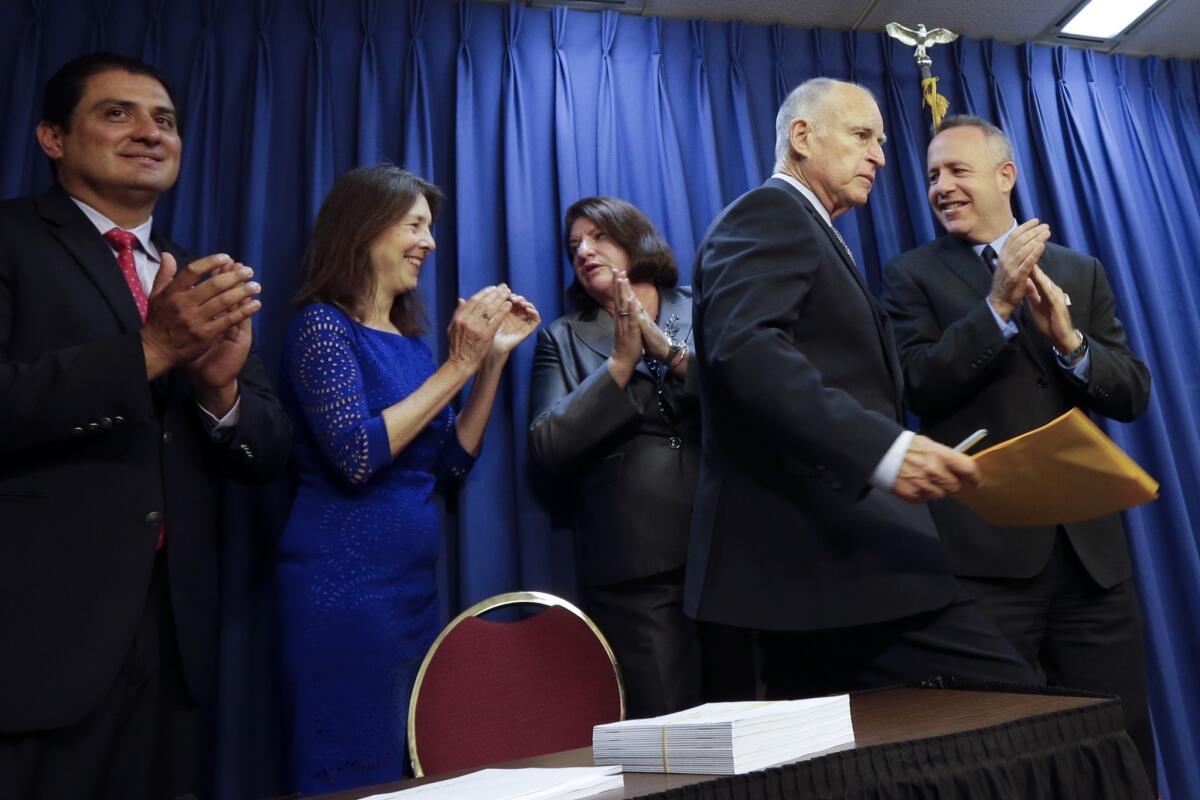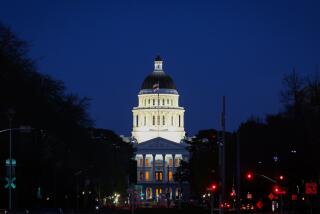Gov. Jerry Brown signs California budget after smooth process

Reporting from Sacramento — Bringing a swift end to a low-key budget process, Gov. Jerry Brown signed California’s new $156.3-billion spending plan on Friday.
He made almost no vetoes when approving the budget, which expands preschool to more poor children, increases welfare payments and ensures a new stream of funding for the controversial bullet train project. Brown said the budget was proof that California has shaken off its dysfunctional reputation while Washington is “mired in gridlock and partisanship and extreme polarization.”
“State government in California is actually working,” he said at a signing ceremony with top lawmakers in San Diego. “It’s fiscally responsible. And not only just for the moment, but paving the way for very long-term fiscal stability.”
The budget, which takes effect July 1, outlines a multiyear spending plan for cap-and-trade revenue, generated from fees on polluters. The money is required to be used for reducing greenhouse gas emissions, and one-quarter will be directed to the bullet train project each year.
The $68-billion project, however, still needs much more funding to be completed. Rep. Kevin McCarthy of Bakersfield, the incoming Republican majority leader in the U.S. House, has pledged to oppose new federal money for the train.
But House Minority Leader Nancy Pelosi, a San Francisco Democrat, said during a recent trip to Sacramento that she’ll continue fighting for high-speed-rail funding. Now that the project can depend on cap-and-trade money, Pelosi said, it will be easier to secure funding from other sources.
“We’re very pleased with the California budget and an assured stream of revenue coming from the climate-change initiative,” she said.
Brown said the state risks falling farther behind other areas of the world without a bullet train of its own.
“We want to be right up there with all the other nations,” he said. “C’mon, let’s get with it.”
The governor signed 17 budget bills in total Friday.
One of them includes another controversial measure that could restrict how much money individual school districts can keep in their reserves. The proposal, which was inserted late in the budget process, was harshly criticized by education officials as a giveaway to the teachers union, which wants more money available for contract negotiations.
“It’s part of the legislative process, where no one gets everything they want,” Brown said. “I’m here to get things done, not to engage in theological niceties or perfection.”
Another bill grants new powers to the California Coastal Commission, allowing it to fine property owners who block public access to the coast. The proposal stalled in the Legislature last year, but Assembly Speaker Toni Atkins (D-San Diego) was able to resuscitate the measure and include it in the budget.
“Californians own their coast,” said Will Shuck, spokesman for Atkins. “And someone trying to keep them from their coast needs an incentive to knock it off.”
One more budget bill, intended to fix the $74-billion shortfall in the teacher pension fund over the next three decades, is expected be signed by the governor next week. The measure would phase in higher contribution rates for the state, schools and employees, with most of the cost falling on the schools.
Other long-term costs remain unaddressed, such as $64.6 billion for healthcare benefits for retired state workers.
“I can’t do everything in one year, or even four years,” Brown said. “That’s one of the reasons why I’m running for another four years.”
The governor barely used his veto power on the budget, but he did shave funding for a few state positions and made some technical changes.
Brown’s Department of Finance previously expressed concern about a proposed $3.2-million subsidy for the United Farm Workers’ healthcare plan, which is falling short of standards under President Obama’s federal overhaul and needs money to provide supplemental insurance to keep operating.
But he did not veto the spending, which Democratic lawmakers said was necessary to prevent patients from winding up on public healthcare rolls at even higher costs to the state.
Keely Bosler, chief finance deputy, said the union needed a one-time infusion of money while it stabilizes its healthcare plan.
“It’s something we will be monitoring and hopefully get out of the business of doing next year,” she said.
Twitter: @chrismegerian
Times staff writer Tony Perry contributed reporting from San Diego.
More to Read
Sign up for Essential California
The most important California stories and recommendations in your inbox every morning.
You may occasionally receive promotional content from the Los Angeles Times.










